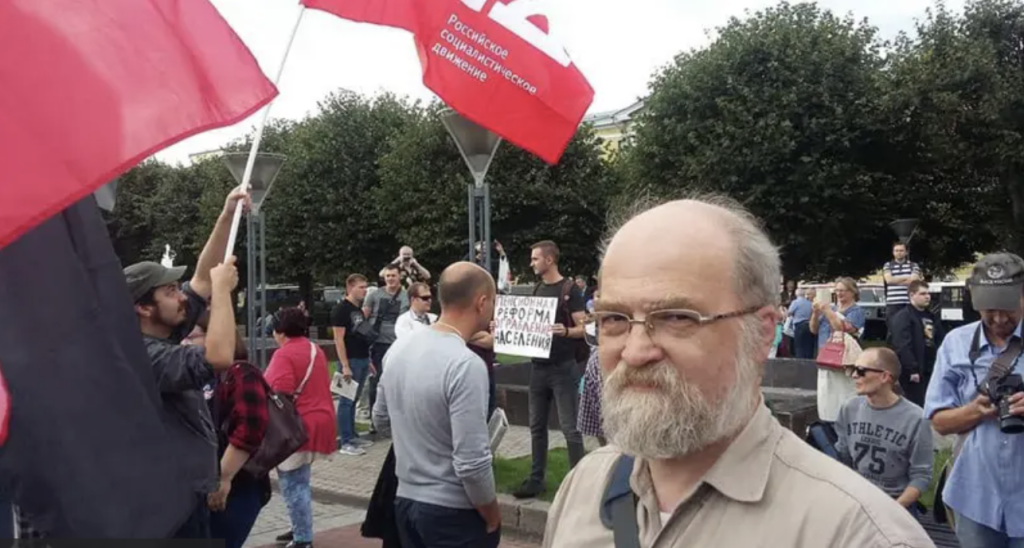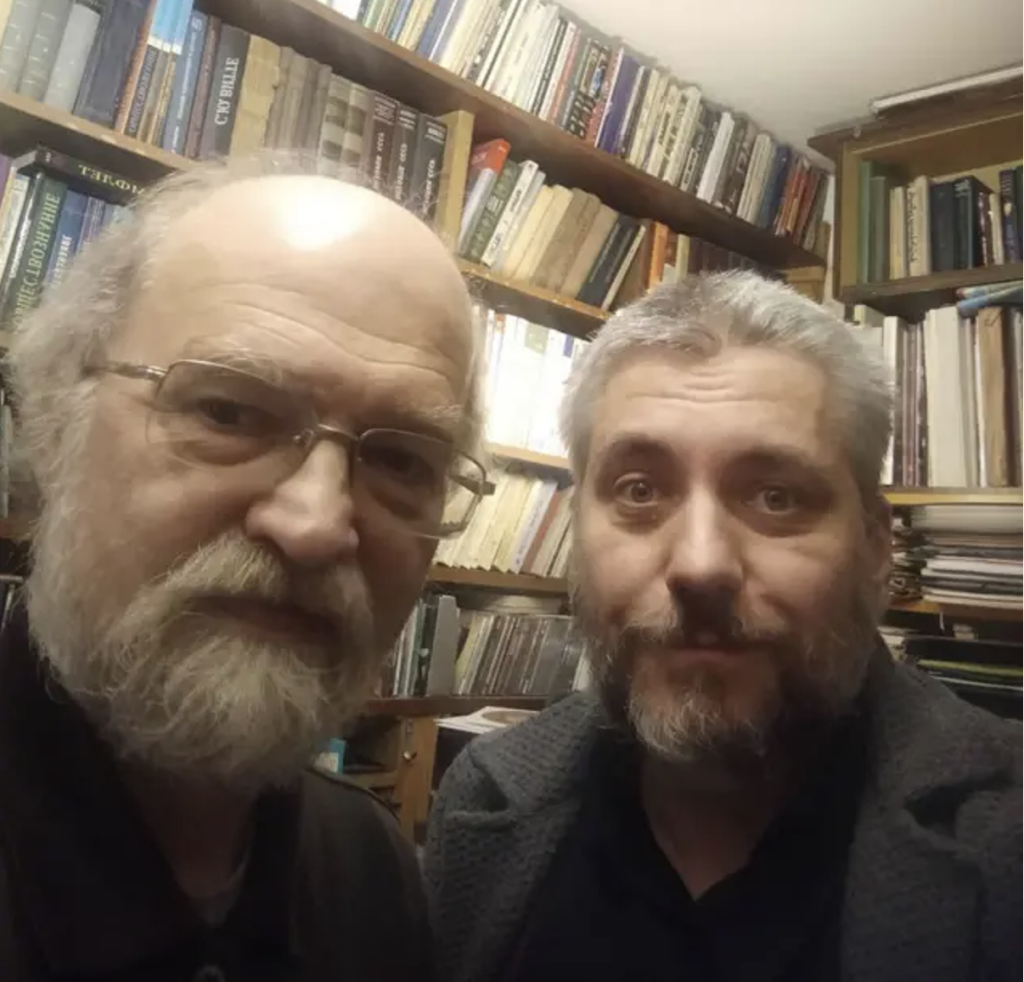On March 21, 2025, a court in St. Petersburg sentenced 67-year-old journalist Alexander Skobov to 16 years in prison for his interviews and anti-war publications in the social networks. Reports of this sentence were perceived by many, including myself, as a sensation. Not because journalists are never imprisoned in Russia, but, on the contrary, because it seemed that all well-known journalists who dared to criticize the government had long since been killed, imprisoned or left the country. Writing through internet from the out of the country locations made them inaccessible to Russian punitive authorities.
At least 45 Russian journalists became subjects of criminal prosecution in 2024. Compared to the previous year, this number has almost doubled, according to the final report of the “Media Rights Protection Center” published on January 22, 2025.
Over the past year, Russian courts have issued at least 27 criminal sentences against journalists, including ten in absentia. “Ten in absentia” were sentences to the Russian journalists, who are located now out of Russia and reach Russian readers only through internet.
So why an experienced journalist and a dissident Skobov did not leave Russia and let himself to be arrested?
Here are some details of this sensational case.
Wikipedia:
“Aleksandr Valerievich Skobov (born November 4, 1957, Leningrad, RSFSR, USSR) is a Russian politician, journalist, historian and human rights activist, left-liberal publicist, dissident and political prisoner.”
In 1988, Alexander Skobov became the last person to be charged under the article on “anti-Soviet agitation.” In 2024, Skobov, who was recently declared a “foreign agent” by the Russian authorities, was convicted for protesting against the war.
Skobov’s social media, Facebook and Telegram, contained material that could serve today in Russia as grounds for multiple criminal cases, as authorities now prosecute people simply for expressing disagreement with the war. Skobov had strongly condemned the invasion of Ukraine in extremely harsh terms.
According to BBC Reports:
Skobov’s lawyer Veronika Karagodina requested that the dissident not be arrested, among other reasons, because his 90-year-old mother depends on him for support. She also provided medical documents proving that the defendant is seriously ill: he is almost completely blind (he has glaucoma), has diabetes, hepatitis C, and asthma. However, what happened next is: the hearing was closed to the public and the press, at the insistence of the prosecutors. An hour later, Judge Maksimenko sent Skobov to a pre-trial detention for over a year.
Skobov was detained on the evening of April 2, 2024, in St. Petersburg, while visiting human rights activist and former State Duma deputy Yuliy Rybakov. That evening, Rybakov went out for a walk with his dogs, and when he returned home, he found his friend and his wife surrounded by masked security officers.
Rybakov told to BBC: “As my wife later told me, as soon as they entered, they immediately threw him to the floor and then handcuffed him. When I returned, they were all sitting and filling out the protocol.”
Dissident and former State Duma deputy Yuliy Rybakov, whose apartment the security forces raided, is known, among other things, for having his home searched in 1976 by KGB lieutenant Vladimir Putin.
Skobov was first arrested when he was a student. He joined the “Leningrad Left” circle, underground youth groups, that emerged during the Brezhnev era to independently study leftist ideas and even develop their own, which was unacceptable to the Soviet authorities.
In 1978, Skobov became a defendant in a criminal case for distributing the samizdat (underground) journal Perspectives. Only two issues were published, and they arrested Skobov before the third. “Our ‘distribution network’ consisted of handing copies to comrades and acquaintances. That was it,” Skobov later recalled in the late 1980s. He was prosecuted under the article on “anti-Soviet agitation.”
Skobov was subjected to punitive psychiatry twice. The first time, he spent two years in a psychiatric hospital, but after being released, he immediately started organizing an independent trade union—SMOT. He was then sent to the hospital again.
“I have known Skobov since early childhood, but not since birth, because he was arrested four months before I was born,” Vladimir Volokhonsky, a municipal deputy in St. Petersburg and the son of dissident Lev Volokhonsky, told the BBC. Skobov and the elder Volokhonsky were friends and were involved together in independent, and, of course, illegal, trade union activities.
When Vladimir was three years old, his father was tried for anti-Soviet agitation. After Vladimir’s father’s arrest, Alexander Skobov covered the center of St. Petersburg with slogans reading “Free Volokhonsky! SMOT.” That led to his re-arrest. This time, he spent five years in a psychiatric hospital and was only released in 1987.
In 1988, Skobov was once again implicated in a case of anti-Soviet agitation, this time for participating in the creation of the Democratic Union party. However, the case never reached a verdict, as it was closed in 1989 during the height of perestroika. The Democratic Union became the first opposition party in the USSR, and its leader was famous avid democrat Valeria Novodvorskaya.
Like Novodvorskaya, Skobov remained in opposition his entire life. In the 1990s, he actively protested against the war in Chechnya.
“He was decolonizing before it was fashionable,” Vladimir Volokhonsky jokes sadly. In 1995, Skobov wrote an article about the Chechen war, harshly condemning Russia’s actions.
“In the late 20th century, empires held together by iron and blood are doomed to collapse. Today, a multinational state can exist only as a voluntary union of its constituent peoples,” he wrote.
For Vladimir Volokhonsky, Skobov is a family friend, but also a personal friend. When Vladimir grew up and became interested in politics, they both joined the Solidarity movement in the late 2000s and early 2010s. According to Volokhonsky, Skobov helped organize the protests of the winter of 2011–2012 in St. Petersburg. Now, Volokhonsky is in exile, he is wanted in Russia. Meanwhile, Skobov, despite participating in the Free Russia Forum, a platform for Russian opposition abroad, which is labeled as an “undesirable organization” in Russia, continued to live in St. Petersburg.
Yuliy Rybakov says that Skobov understood very well that his posts and interviews with independent media would lead to his arrest. “He was ready for it and perhaps even sought it,” he told the BBC.
Just recently, on March 22, the Russian Ministry of Justice declared Alexander Skobov a “foreign agent”.
Skobov himself wrote on Telegram about police visits: according to him, they wanted to talk to him about an interview he gave to Radio Liberty, but he did not open the door. In March 2024, he wrote that he had been charged with an administrative offense for participating in the Free Russia Forum. He received a notice from the prosecutor’s office about it.
Rybakov also told the BBC that his friend had received a summons for investigative actions: “He had an appointed time, but they decided to come for him earlier. Apparently, they thought he might go into hiding.” Rybakov insists that Skobov flatly refused to go into hiding, no matter how much his loved ones asked him to: “I thought he was sacrificing himself in vain, but he was adamant. It was important for him to stay in Russia, otherwise his words would have been less valuable,” Volokhonsky confirms. “I find it difficult to say whether he was eager to go to jail. But he did everything he could to ensure that the risk of going to jail did not stop him.”
During his arrest, Skobov refused to take his diabetes medication with him and even took off his glasses. Rybakov explains this as a gesture of “last protest”: “As I understand it, he decided to simply sacrifice himself and follow Navalny’s path, to try once again to awaken society and humanity, and to show what is happening in our country.”
Volokhonsky was not sure that Alexander would be able to read letters and write responses in the pretrial detention center due to his poor eyesight. “He has glaucoma, glasses do not help much. He sees only blurry spots. If you write him a text in 32 font, he will probably be able to read it.” Skobov reads using a screen reader program for the visually impaired.
About 10 years ago, the dissident was attacked in the yard with a knife and his phone was taken away, since then his health has deteriorated greatly.
Both of Skobov’s friends spoke to the BBC before the court’s decision to send Skobov to prison, and both were sure that the court could not choose another preventive measure. “Most likely, he will be left in custody, and this will mean that his life expectancy is measured in months,” Rybakov said. “Now it depends on the lawyer whether he can convince him to use medications in the pretrial detention center. Naturally, I am afraid for him. I imagine that for him this is the most dignified and beautiful end to his life. But I say this with tears,” said Vladimir Volokhonsky.
Now, a year later, Alexander Skobov is expected to spend in prison another 16 years!
Here are excerpts from his last words at the court, published by Mediazona sight:
“For me, the comparison between Putin’s and Hitler’s propagandists is not just a rhetorical device. Much of my journalism is dedicated to proving the Nazi nature of Putin’s regime, with which peaceful coexistence is fundamentally impossible.
“I appeal first and foremost to Europe, urging it to remember the foundations of its current system. Since 1945, Europe has been building a world where predators should no longer be masters of life—a world based on the principles of law, justice, freedom, and humanism. Europe has achieved a great deal in this regard and seemed to have permanently rid itself of mass killings and territorial conquests.
“Death to the Russian-fascist invaders! Death to Putin, the new Hitler, the murderer, and the scoundrel! Glory to Ukraine! Glory to the heroes!
“These are the words I usually end my speeches with. But today, I will still be asked whether I plead guilty.
“Well then, here I am the one who accuses. I accuse the ruling Putin clique, reeking of corpses, of preparing, initiating, and waging an aggressive war. Of war crimes against Ukraine. Of political terror in Russia. Of corrupting my people.
“And I ask the servants of the Putin regime present here, the small cogs in its repressive machine: do you plead guilty to complicity in Putin’s crimes? Do you repent for your involvement?
“Now, I have said everything.”
Here is a comment of one of the most popular Russian journalist Alexander Nevzorov, made by him on Radio Liberty:
“Casting historical figures always requires an extremely high political temperature. Apparently, it already exists in Russia.
“Putin’s Gehenna, every day raising the degrees of lawlessness and dictatorship, tried to incinerate everything still alive in the country, to burn out the remnants of dignity and reason from the population.
“But!
“From the inquisitorial flames suddenly appeared a true and impeccable hero.
“Alexander Skobov, blinded in prison, sick, tortured, tortured by Putin’s assholes in shoulder straps and robes, showed an example of courage and wisdom.
“He did not bow a millimeter before the punitive system crushing him and has already entered history as a standard of behavior. He gave everyone a lesson in how and in what expressions one should communicate with the regime.”



